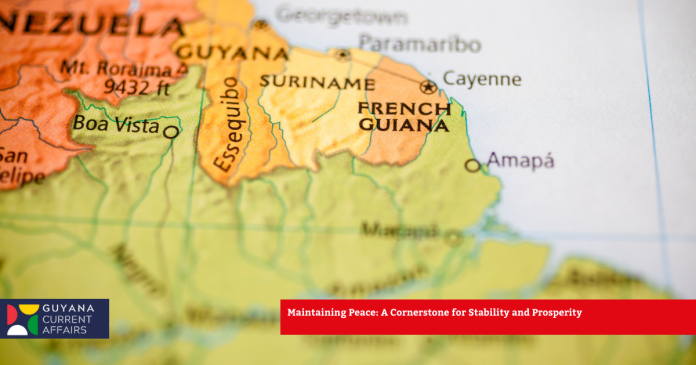The United Nations Security Council (UNSC) has reaffirmed the critical importance of maintaining zones of peace for regional stability and economic prosperity. This stance comes amid growing concerns over potential escalations in various parts of the world, including tensions between Guyana and Venezuela.
In a recent press statement, the UNSC expressed concern about the possible escalation of tensions between Venezuela and Guyana, urging both parties to exercise maximum restraint. The Council emphasized the importance of maintaining regional peace and security, particularly in Latin America and the Caribbean, which has been designated as a zone of peace.
The Declaration of Argyle for Dialogue and Peace, signed by Guyana and Venezuela on December 14, 2023, exemplifies the regional efforts to maintain peace. This agreement commits both nations to resolve their differences through peaceful means, adhering to international law and the principles of good neighborliness.
Carolyn Rodrigues-Birkett, Permanent Representative of Guyana to the UN, highlighted the significance of preserving peace in the region. “Maintaining Latin America and the Caribbean as a continuing ‘zone of peace’ is vital for the prospects of the 670 million people who live here,” she stated during Guyana’s presidency of the Security Council in February 2025.
The concept of zones of peace extends beyond the Americas. In Central Asia, efforts to establish a zone of peace, trust, and cooperation have been recognized as creating a foundation for greater regional collaboration and stability.
Experts argue that peaceful regions are more conducive to economic growth and social development. Stable environments attract foreign investment, promote trade, and allow governments to focus resources on infrastructure, education, and healthcare rather than defense spending.
The UNSC has also emphasized the role of regional organizations in maintaining peace. The African Union Peace and Security Architecture (APSA) and its Continental Early Warning System have been highlighted as crucial mechanisms for conflict prevention and regional stability.
However, the Council stressed that while regional bodies play a vital role, this does not absolve the UNSC of its primary responsibility for maintaining international peace and security.
As the world looks towards the Summit of the Future and the 2025 Peacekeeping Ministerial Meeting, there is a growing consensus on the need to strengthen peacekeeping operations. This includes enhancing training, modernizing equipment, and improving strategic planning to address evolving global challenges.
The UNSC has also called for increased inclusivity in peacekeeping efforts, emphasizing the full and equal participation of women at all levels and the implementation of resolution 2250 on Youth, Peace and Security.
As tensions persist in various regions, the international community remains committed to the principle that maintaining zones of peace is not just a diplomatic ideal but a practical necessity for global stability and prosperity. The challenge now lies in translating these commitments into tangible actions that can secure lasting peace in troubled regions around the world.


